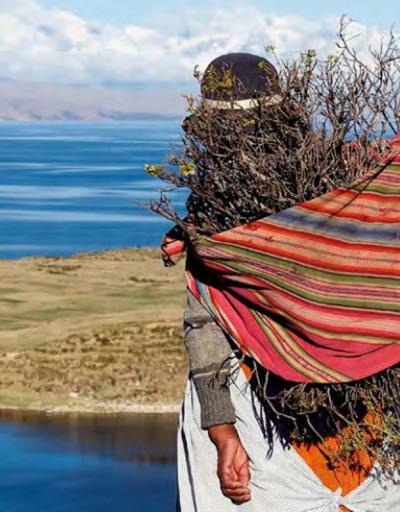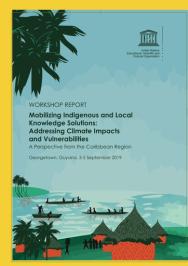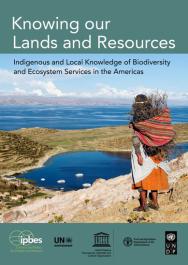
Latin America and the Caribbean
There are substantial and diverse populations of Indigenous Peoples in Latin America and the Caribbean (LAC), has as well as local communities. A number of Small Island Developing States (SIDS), which are a priority group for UNESCO, are also found in the region. The Caribbean SIDS and the wider Caribbean basin have been greatly impacted by climate changes and natural hazards, affecting the marine and terrestrial ecosystems. The Local and Indigenous Knowledge Systems (LINKS) Programme of UNESCO has increased its focus on supporting the Caribbean sub-region, while much of the Indigenous and local knowledge work is carried out in the region within the framework of the UNESCO Man and Biosphere (MAB) Programme.
The Indigenous heritage of the Caribbean is overlayed with the effects of colonisation, slavery, immigration and liberation. It is within this highly multicultural space, and the specificities of the tropical climate, that Indigenous Peoples and local communities have created sustainability and are constantly innovating in their adaptation to the challenges and opportunities they face. The specifics of extreme weather events and slow onset changes to the environment and climate, make adaptation and nature-based / culture-based solutions of primary importance in the region.
A region of tremendous diversity
Climate change
The first major dialogue of Indigenous Peoples and local communities of the Caribbean focusing on how they have been applying their respective knowledge systems to cope with climate change impacts, disaster risks and building resilience was initiated in 2019.
It was organized by UNESCO-LINKS with the support of the UNESCO National Commission of Guyana and in cooperation with the United Nations Framework Convention on Climate Change (UNFCCC), the World Meteorological Organisation (WMO) and the Caribbean Community Climate Change Centre.
Supporting Indigenous knowledge in the Caribbean

and local communities in the Caribbean.

and observations to improve understanding of the impacts of climate change, including extreme events.

in Caribbean climate change adaptation.

of Indigenous and local knowledge being applied to risk reduction, resilience, coping and recovery strategies.

in support of Indigenous knowledge in climate change policy.
Mobilising Indigenous and Local Knowledge Solutions: Addressing Climate Impacts and Vulnerabilities—A perspective from the Caribbean Region
To support Indigenous knowledge in the region, a workshop on Mobilising Indigenous and Local Knowledge Solutions: Addressing Climate Impacts and Vulnerabilities—A perspective from the Caribbean Region was organised in Georgetown, Guyana on 3–5 September 2019. The event provided a landmark for promoting greater inclusion of Indigenous Peoples and local communities in national adaptation policy making and encouraging greater cooperation with meteorologists and other experts working on climate and resilience.

Maya ancestral climate observation, honed over millennia, is still practiced today: Indigenous farmers predict rain by watching flood flies and black army ants, and listening to howler monkeys. Cicadas announce the coming of the dry season, likewise, heralded when the cotton trees drop their leaves. If the Maya see the moon surrounded by a ring of clouds at 8pm, rain is certain the following day—unless there is a rainbow.
A series of other activities have been taken up in the region, notably the policy dialogue on Indigenous knowledge in Guyana, research led by Surinamese Indigenous researchers on traditional knowledge of fire regimes, and engagement with youth from French Guyana on the International Decade of Indigenous Languages.
Biodiversity
Ibero-American MAB Network (IberoMAB)
Participatory governance and management of UNESCO sites is a priority in Central America. UNESCO reaches a wide audience through its designated sites and networks, including the World Network of Biosphere Reserves and its IberoMAB network, the International Geoscience Programme (IGCP) and UNESCO Global Geoparks. These sites and programmes demonstrate that people and nature can live in harmony, and that economic development can be reconciled with the sustainable management of natural resources when science and Indigenous knowledge systems are essential components for decision-making.
The IberoMAB Network is comprised of UNESCO Biosphere reserves in Latin America, the Caribbean, Portugal and Spain. UNESCO offices in Latin America and the Caribbean support the IberoMAB Youth Network, as well as cooperation with Indigenous and local knowledge holders.
IberoMAB explores the application of Indigenous knowledge to biosphere reserves, particularly in dealing with the specific challenges of wildfires and the conservation of threatened species. IberoMAB plays a key role in engaging Indigenous Peoples in the governance and management of biosphere reserves and encouraging the connection between cultural and natural heritage.
Mayangna Knowledge in the Bosawas Biosphere Reserve, Nicaragua
This bilingual Mayangna community-led education project in Nicaragua is LINKS' most extensive initiative in Central America. With LINKS' support, the Indigenous Mayangna people of Bosawas Biosphere Reserve documented their knowledge of the freshwater ecosystems and biodiversity. The Mayangna people have lived in the east and north-central part of Nicaragua and in Honduras for centuries. They have developed an intricate and extensive knowledge of the local flora and fauna and have shaped the biological system through their cultural practices.
The first ever detailed materials of Mayangna knowledge, available in Spanish and Mayangna, provide a landmark of educational transformation for sustainable development.
Brief presentation


Biodiversity in Argentina
In 2021, a series of virtual dialogue workshops were held to inform Indigenous Peoples and local communities of the work of the Intergovernmental Science-Policy Platform on Biodiversity and Ecosystem Services (IPBES) on Indigenous and local knowledge, with a focus on potential contributions to assessments of ecosystem biodiversity. The workshops and dialogue served to promote public awareness and discussion about the findings of the IPBES Global Assessment, and specifically how Indigenous Peoples see their role in protecting biodiversity and ecosystems.
The series was organized by UNESCO-LINKS in collaboration with the Association of Indigenous Youth of Argentina, Rural Women's Network of the Gran Chaco Foundation and the Indigenous organisation M+ranta Kuñaretq (Fuerza de la Mujer) of Argentina.
Indigenous water cultures in Latin America and the Caribbean
The International Hydrological Programme (IHP) in Latin America and the Caribbean promotes the incorporation of Indigenous water cultures of the region into integrated sustainable water management as well as in actions developed for universal water access.
A series of activities were implemented to promote Indigenous water cultures:
- In March 2018, Indigenous leaders from Maya-Poqoman (Mexico), Mapuche (Chile), the Council of 13 Native Leaders (Brazil) communities and Pastaza local government basin (Ecuador) participated in the Session “Water Cultures of the Indigenous Peoples of Latin America" during the 8th World Water Forum in Brazil.
- In August 2019, UNESCO organized the workshop “Indigenous Knowledge for Integrated Water Management in Latin America and the Caribbean” focused on Indigenous Peoples’ sociocultural, technical, legal, economic and political aspects of water management in the region, on the International Day of the World’s Indigenous Peoples, in Manaus, Brazil.
UNESCO-IHP together with UNESCO Brasilia and UNESCO Quito, have partnered with the Conference of Iberoamerican Water Directors, the Brazilian National Water Agency and with the collaboration of the Amazonian Cooperation Treaty Organization as well as the Brazilian Cooperation Agency, and the UNESCO Chair on Water and Culture (UDELAR, Uruguay).

BES-Net in Latin America & the Caribbean
In 2020, UNESCO-LINKS joined the Biodiversity and Ecosystem Services Network (BES-Net) initiative, co-implemented with the United Nations Development Programme (UNDP) and the UN Environment Programme World Conservation Monitoring Centre (UNEP-WCMC), that aims to build capacity and commitment for biodiversity action across the world by translating the latest Intergovernmental Science-Policy Platform on Biodiversity and Ecosystem Services (IPBES) products into action on ground. UNESCO-LINKS leads the BES-Net Indigenous and local knowledge (ILK) Support Unit. UNESCO-LINKS is supporting the Dominican Republic and Grenada to incorporate ILK in their national ecosystem assessment. UNESCO-LINKS is also supporting Colombia to promote Indigenous and local knowledge recommendations and key findings from Colombia national ecosystem assessment that was completed in 2021.



